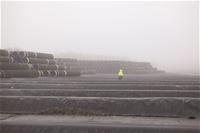In the hour of the gas fog
Ralitsa Kovacheva, July 2, 2010
 The last thing that may come to your mind in the eve of a July Morning are the prices of gas and heating. Well, at least before you read the newspapers. It is not a surprise that the price of gas has risen by nearly 25 percent, because you may remember what happened before the elections with the gas price on July 1 2009? It was decreased by as much as 30 per cent. Obviously, international markets register quite precisely the Bulgarian political situation and have promoted the use of gas prices as a carrot and stick. And do you remember that the legendary minister and coryphaeus of Economy Petar Dimitrov “gave" to the residents of the Bulgarian capital Sofia (“pre-electionally” again) another year with lower heating costs?
The last thing that may come to your mind in the eve of a July Morning are the prices of gas and heating. Well, at least before you read the newspapers. It is not a surprise that the price of gas has risen by nearly 25 percent, because you may remember what happened before the elections with the gas price on July 1 2009? It was decreased by as much as 30 per cent. Obviously, international markets register quite precisely the Bulgarian political situation and have promoted the use of gas prices as a carrot and stick. And do you remember that the legendary minister and coryphaeus of Economy Petar Dimitrov “gave" to the residents of the Bulgarian capital Sofia (“pre-electionally” again) another year with lower heating costs?
Under the maxim about the guilty and the cheese cake (it is not to blame the one who eats the cheese cake but the one who gave it to him), it is not a surprise that each government is willing to play with the prices of gas. Firstly, because there are a monopolist beside a monopolist along the supply chain, and secondly because the information blackout on the matter is impenetrable. There is not much to say about the first because the situation as it seems will not change and this applies not only to Bulgaria. The European Union claims it is also trying to make its gas supplies not only independent, but at least less dependent on Russia. In practice, however, the last major event on the topic was the official start of the construction of the “Nord stream” pipeline, that will supply Germany directly with Russian gas under the Baltic Sea.
Bulgaria, for its part, also claims that diversification of supplies is needed. In practice, however, it does nothing about it. The country can hardly make much on its own and the vague and too fragile European energy policy is still not reliable. Nonetheless it is our only chance. Bulgaria, however, is playing on its own or at least this game is being led by President Gheorghi Parvanov. He is again in Azerbaijan for the second time and has once again negotiated gas, but for half a year many things are being forgotten and obviously the same news could be a news twice.
It is interesting that it was Parvanov - the "Grand Slam" man - that has committed so much to reducing Bulgaria's dependence on Russian gas. It is also interesting how Bulgaria will practically receive the agreed one billion cubic meters of gas and how this will affect the amounts it receives from “Gazprom”, given the reduced consumption because of the crisis and especially at a time when the country is trying to renegotiate its contracts with the Russian monopolist, apparently without success so far.
And now I come to my point about the information fog. Under the sign of a trade secret, the agreements with “Gazprom” have never become public, especially the notorious annexes, signed in 2006 by Rumen Ovcharov (the then Minister of the Economy and a member of the Bulgarian Socialist Party, BSP). For years this has been a central issue in all election campaigns - BSP claims that the best prices had been negotiated, and the right-wing parties claim that it is these annexes to blame for the continuously rising prices of gas. Even a few days ago the Minister of the Economy Traycho Traykov promised to provide all enterprises with a portrait of Rumen Ovcharov to give them the opportunity to thank him every morning for the disadvantageous contract.
And suddenly something strange has happened. As “Dnevnik” daily reported, the parliamentary Economic Committee rejected a proposal for a review of the cited annexes. Moreover, thanks to 10 abstention votes of the representatives of the ruling party GERB (Citizens for European development of Bulgaria). The proposal was made by Ovcharov himself. According to Dnevnik, in favour of the proposal voted only three socialists and one MP from the right-wing “Blue Coalition”. "Sorry, Mr. Ovcharov, your proposal has been rejected, said after the vote the Chairman of the Economic Committee Martin Dimitrov (Blue Coalition)”.
Why has the ruling majority refused to bring at least a little light on the issue when it had this possibility? Why did “the Blue”, which were the strongest critics of the annexes, not insist on their disclosure, at least in the Economic Committee? Why did the business, that has challenged in court the appreciation of gas prices by nearly 24 percent in the autumn of 2008, is now silent, although the impact on companies will hardly be easier?
It is clear why. Monopoly, control, lack of information and as a result - political manipulation. Would you bet what will happen to gas prices next summer before the presidential and local elections?
If the hot water is too expensive to you now, put off the bathing for then.